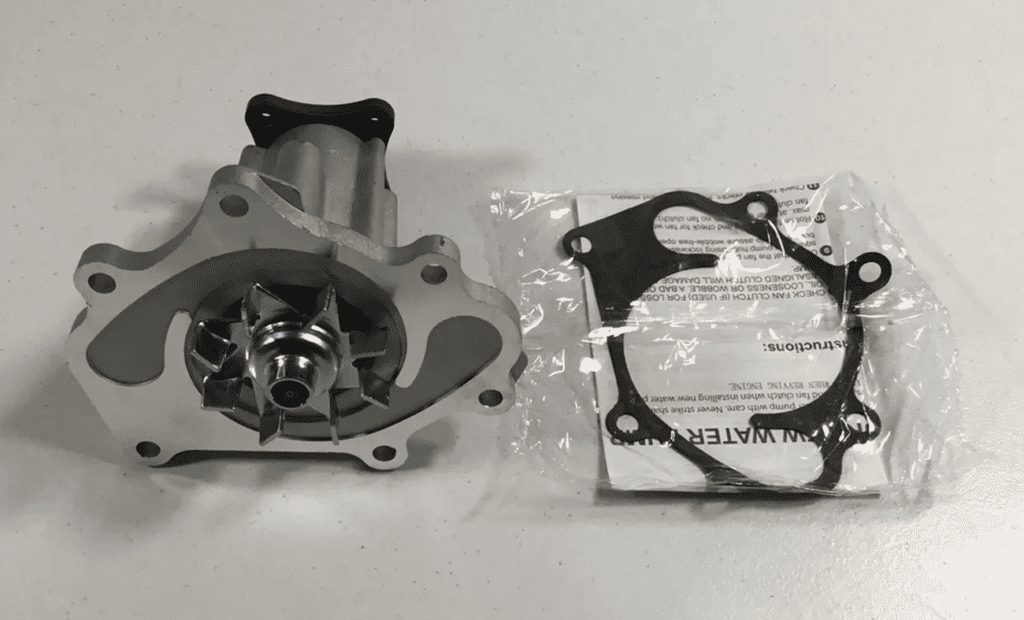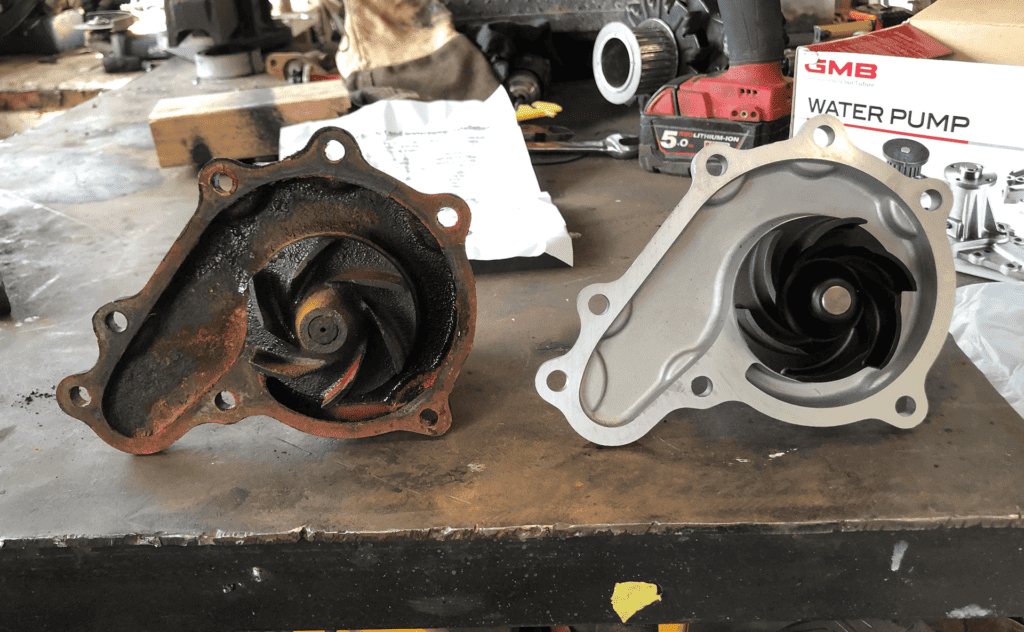Navigating the Waters of Water Pump Replacement
Embarking on the journey of replacing your vehicle’s water pump, you’re not just buying a part; you’re investing in your car’s future. The water pump is a cornerstone of your vehicle’s cooling system, pivotal in maintaining engine health and performance. This guide will equip you with the knowledge to choose a water pump that meets your vehicle’s needs and enhances its performance, ensuring a smooth and reliable drive.
Key Considerations: What to Look for in a New Water Pump
When embarking on the quest for a new water pump, several vital factors come into play, ensuring you make the best choice for your vehicle. Compatibility tops the list; the water pump must align perfectly with your vehicle’s specifications. This means checking the make, model, and year of your car to ensure the water pump fits correctly and functions as intended. A mismatch can lead to inefficiency and potential damage, emphasizing the importance of precise compatibility.
The quality of the materials used in the water pump’s construction is another key consideration. High-quality materials like cast iron or aluminum offer durability and longevity, ensuring that the pump can withstand the rigors of constant use without succumbing to wear and tear prematurely. A robust water pump not only promises an extended lifespan but also provides peace of mind, knowing that your vehicle’s cooling system is reliable.
Brand reputation plays a pivotal role in your selection process. Renowned brands often come with the assurance of quality, reliability, and better after-sales support. Investing in a well-known brand might come at a higher initial cost, but it generally translates to better performance and longevity, offering value for money in the long run.
The pump’s technical specifications, including its flow rate and pressure capabilities, are crucial to its operation. These determine how efficiently the pump circulates coolant throughout the engine. An optimal flow rate ensures that the coolant is distributed evenly and rapidly, maintaining the engine at the correct temperature. Meanwhile, adequate pressure ensures that the coolant reaches all parts of the engine, preventing hot spots that can cause damage. Balancing these factors is key to finding a water pump that not only fits your vehicle but also enhances its performance and longevity.

Matching Your Vehicle’s Needs: Selecting the Appropriate Water Pump
• Engine Compatibility: The right water pump must be compatible with your specific engine type. Different engines have varying cooling requirements, so the pump must be capable of handling your engine’s size and power output.
• Model Specificity: Each vehicle model might require a unique water pump design. These specifications are often outlined in your vehicle’s manual or can be provided by a dealership or professional mechanic.
• OEM vs. Aftermarket: Consider whether to purchase an Original Equipment Manufacturer (OEM) pump or an aftermarket option. OEM pumps are designed specifically for your vehicle model, ensuring a perfect fit and optimal performance, while aftermarket pumps might offer a cost-effective alternative but require careful selection to ensure compatibility.
• Installation Requirements: Be aware of the installation process for your specific vehicle. Some water pumps may require more complex installation procedures, which could affect your choice if you plan to install it yourself.
The Domino Effect: Additional Parts to Consider When Replacing a Water Pump
Water pump replacement is often more than just swapping out an old pump for a new one. It’s a process that should ideally include the examination and, if necessary, the replacement of related components. This includes the timing belt or chain, which may have to be removed to access the water pump, and gaskets, which ensure a leak-free seal between the water pump and the engine.
Additionally, considering the thermostat, which regulates the flow of coolant through the engine, is prudent. Replacing these components in tandem with the water pump can prevent future issues, ensuring the longevity and effectiveness of the new pump. This holistic approach to maintenance can avert the piecemeal replacements that often lead to recurring problems and increased costs over time.
Efficiency Matters: Understanding the Performance Metrics of Water Pumps
• Flow Rate: The flow rate of a water pump determines how much coolant can be circulated through the engine per minute. An adequate flow rate is essential to maintain the engine at an optimal temperature, especially under high-load conditions.
• Pressure Capabilities: The pump must be able to maintain the correct pressure throughout the cooling system to ensure efficient heat transfer and avoid boiling over or cavitation, which can damage the engine.
• Material Quality and Design: The construction material and design of the pump impact its efficiency and durability. For instance, pumps with a cast iron or aluminum housing can offer better durability and heat dissipation.
• Energy Consumption: Consider the energy efficiency of the water pump, especially in newer models that may use electric pumps. An energy-efficient pump reduces the load on the engine and can contribute to better fuel economy.
• Compatibility with Coolant Type: Ensure the water pump is compatible with the type of coolant used in your vehicle. Some coolants may be more corrosive or require different pump materials to avoid degradation.
Performance Upgrades: The Impact of a New Water Pump
Installing a new, high-quality water pump can have a noticeable impact on your vehicle’s performance. By maintaining an optimal engine temperature, a well-functioning water pump ensures efficient fuel use and prevents engine components from overheating. This translates to a smoother running engine with potentially improved horsepower and torque output.
A robust water pump contributes to a consistent operating temperature, vital for the engine’s longevity and reliability. This consistency is especially important in extreme driving conditions, whether it’s high-speed driving or navigating challenging terrains. The right water pump can, therefore, not only enhance your immediate driving experience but also contribute to the long-term health of your vehicle’s
Brand and Budget: Balancing Quality with Cost
Quality Assurance from Reputable Brands: Established brands in the water pump market are often synonymous with quality. These brands have built their reputations on reliable and durable products, backed by rigorous testing and quality control measures. Choosing a well-known brand can provide peace of mind, knowing that the product has been crafted to meet high standards.
Cost Implications: It’s important to weigh the initial cost against the potential long-term savings. Cheaper, off-brand water pumps may initially seem like a bargain, but they can sometimes lead to frequent replacements or additional repairs down the line. A more expensive, branded water pump might have a higher upfront cost, but its durability often means fewer issues over time, ultimately saving money.
Warranty Considerations: Premium brands often offer more comprehensive warranties. These warranties can be invaluable, providing protection against defects and malfunctions. In the long run, a water pump with a solid warranty can save considerable costs in potential repairs or replacements.
Research and Reviews: Before making a purchase, research different brands and read customer reviews. Reviews from other vehicle owners can offer practical insights into a pump’s performance and reliability, aiding in making an informed decision.

Calculating the Costs: Understanding the Price of Replacement
Component Cost: The water pump itself varies in price, typically between $100 to $300. Prices differ based on the pump’s build quality, materials, and compatibility with specific vehicle models. Higher-end pumps with advanced features may cost more but offer better performance and longevity.
Labor Costs: Installing a water pump can be labor-intensive, particularly for engines with complex layouts. Labor costs can range widely, from $200 to $450, depending on the mechanic’s rate and the time required for installation. Choosing a skilled mechanic ensures the job is done right, avoiding future complications.
Associated Parts: Often, replacing a water pump involves additional costs for related components like belts, gaskets, and coolant. These parts, while adding to the total expense, are crucial for a complete and reliable repair.
Potential Savings: Investing in a quality water pump replacement can save money in the long term by reducing the frequency of repairs and extending the overall lifespan of your vehicle’s engine. Additionally, a well-functioning cooling system can improve fuel efficiency, offering further cost benefits.
Making an Informed Decision for Long-Term Benefits
Choosing the right water pump is about making an informed decision that aligns with your vehicle’s needs and your long-term financial planning. Understanding the key factors such as compatibility, efficiency, brand reputation, and the associated costs of replacement is crucial. Regular water pump maintenance and timely replacement, ideally through professional services like Uchanics, can prevent costly future repairs, ensuring your vehicle remains in optimal condition for the long haul.
